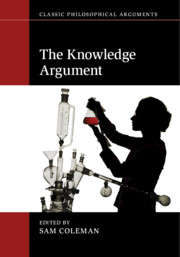Book contents
- The Knowledge Argument
- Classic Philosophical Arguments
- The Knowledge Argument
- Copyright page
- Contents
- Contributors
- Introduction: The Enduring Significance of Jackson’s Knowledge Argument
- 1 The Knowledge Argument Is an Argument about Knowledge
- 2 There’s Nothing about Mary
- 3 Acquaintance, Parsimony, and Epiphenomenalism
- 4 Acquaintance and Phenomenal Concepts
- 5 The Knowledge Argument Meets Representationalism about Colour Experience
- 6 The Mary-Go-Round
- 7 Concept Mastery, Social Externalism, and Mary’s New Knowledge
- 8 Mary’s Powers of Imagination
- 9 The Knowledge Argument Is Either Indefensible or Redundant
- 10 Grounding, Analysis, and Russellian Monism
- 11 Phenomenal Knowledge Why: The Explanatory Knowledge Argument against Physicalism
- 12 The Knowledge Argument and the Self
- 13 What Uninformed Mary Can Teach Us
- Bibliography
- Index
3 - Acquaintance, Parsimony, and Epiphenomenalism
Published online by Cambridge University Press: 09 September 2019
- The Knowledge Argument
- Classic Philosophical Arguments
- The Knowledge Argument
- Copyright page
- Contents
- Contributors
- Introduction: The Enduring Significance of Jackson’s Knowledge Argument
- 1 The Knowledge Argument Is an Argument about Knowledge
- 2 There’s Nothing about Mary
- 3 Acquaintance, Parsimony, and Epiphenomenalism
- 4 Acquaintance and Phenomenal Concepts
- 5 The Knowledge Argument Meets Representationalism about Colour Experience
- 6 The Mary-Go-Round
- 7 Concept Mastery, Social Externalism, and Mary’s New Knowledge
- 8 Mary’s Powers of Imagination
- 9 The Knowledge Argument Is Either Indefensible or Redundant
- 10 Grounding, Analysis, and Russellian Monism
- 11 Phenomenal Knowledge Why: The Explanatory Knowledge Argument against Physicalism
- 12 The Knowledge Argument and the Self
- 13 What Uninformed Mary Can Teach Us
- Bibliography
- Index
Summary
Why does Mary learn something when she leaves the room? One answer, endorsed by some physicalists as well as most dualists, is as follows. Mary learns something because phenomenal knowledge requires direct acquaintance with phenomenal properties. For this reason, there is an epistemic gap between the physical and the phenomenal: phenomenal facts cannot be deduced from physical facts. This is the acquaintance response to the Knowledge Argument. The physicalist and dualist versions of the acquaintance response diverge as to whether this epistemic gap reveals an ontological gap between the physical and the phenomenal.
- Type
- Chapter
- Information
- The Knowledge Argument , pp. 62 - 86Publisher: Cambridge University PressPrint publication year: 2019
- 3
- Cited by

